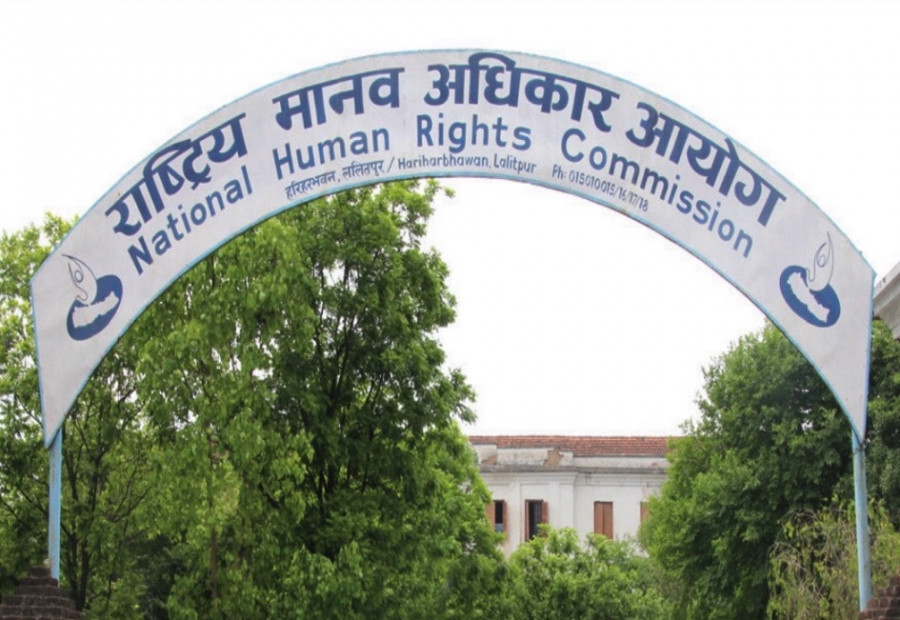National
Rights commission tells global body ‘court will test legality of key appointments’
Global Alliance of National Human Rights Institutions is set to revisit the ‘A’ status of National Human Rights Commission.
Binod Ghimire
The National Human Rights Commission has used the sub judice writ petitions at the Supreme Court as an excuse to defend the appointments of its chairperson and four members.
Responding to the concerns from the Global Alliance of National Human Rights Institutions, the commission has said the petitions challenging the appointments are under consideration at the court, which would test the legality and the constitutionality of the selection.
The alliance, an umbrella body of the human rights institutions from 127 countries, in its letter to the commission on June 28 had denounced the appointment process and informed that the prestigious ‘A’ grade status the commission enjoys would be reviewed. The letter addressed to the commission’s chair Top Bahadur Magar had said that its sub-committee on accreditation has decided to conduct a special review in October. The letter, written by Afarin Shahidzadeh, secretary of the sub-committee, had given the commission an opportunity to submit its clarification by July 28 if the appointments were done complying with existing international norms.
“Your institution is invited to provide information on the following: The selection and the appointments of the NHRC members were conducted in compliance with the Paris Principles…. at the latest by July 28, 2021,” said the letter.
According to Murari Kharel, secretary at the national human rights watchdog, their response forwarded to the alliance headquarters in Geneva on Wednesday doesn’t defend the appointments as the Supreme Court is to decide on the matter.
“We haven’t defended the appointment process. The response only cites the constitutional and legal provisions regarding the appointments,” he told the Post. “We have said as the case is sub judice at the Supreme Court, it will test the constitutional and legal grounds of the appointments.”
A total of three writ petitions challenging the appointments of 52 chairpersons and members in 12 constitutional commissions are sub judice at the Constitutional Bench of the Supreme Court. There have been no hearings on the petitions filed since December.
The alliance in March had sought clarification from the government if the autonomy and independence of the commission, as mandated by the Paris Principles, were ensured in the appointment process. In reply, the government had maintained that the appointments were made fulfilling due legal process without jeopardising the autonomy of the constitutional commission. Not convinced with the government’s response, the alliance decided to revisit the ‘A’ status of the commission as per Article 16.2 of its statute. The Article says where, in the opinion of the alliance’s chairperson or of any member of the sub-committee on accreditation, it appears that the circumstances of any national human rights institution that has been accredited with ‘A’ status may have changed in a way that affects its compliance with the Paris Principles, the chairperson of the alliance or the subcommittee may initiate a review of that institution’s accreditation status.
Adopted in 1993 by the United Nations General Assembly, the Paris Principles set six criteria that national human rights institutions need to follow. These include autonomy from the government and independence guaranteed by the constitution besides adequate competence, pluralism and the availability of resources and powers to carry out investigations. Bed Bhattarai, a former secretary at the commission, said the alliance was looking for the commission’s justification if the appointment process followed the Paris Principles.
“The alliance gave the commission a final opportunity to present the justification before revisiting its ‘A’ status,” he told the Post.
The ‘A’ status is given to human rights bodies that function independently of the government and appointments of its leadership adhere to the Paris Principles. At present, human rights commissions from 84 countries from among the 127 that are members of the alliance have this status.
Article 248 (2) of the constitution says the President shall, on the recommendation of the Constitutional Council, appoint the chairperson and members. However, not only were the appointments made without parliamentary hearings but their names had been recommended by the council’s meeting boycotted by Speaker of the House of Representatives Agni Sapkota and Nepali Congress President Sher Bahadur Deuba, then leader of the opposition in the House of Representatives.
Hours prior to the meeting that made recommendations for 38 positions in various constitutional bodies, the Constitutional Council (Functions, Duties, and Procedures) Act was amended through an ordinance on December 15 requiring the presence of only a simple majority of the five existing members of the council for its meeting to be considered legal. The appointment process also contradicted a precedent by the Supreme Court.
Ironically, on September 10, 2010, a full bench of the Supreme Court led by Magar, who was a justice at the Supreme Court then, had said the information regarding the meeting of the Constitutional Council must be given 48 hours in advance.
As the recommendations were made on the same day the ordinance was issued, the 48-hour provision was not followed. Human rights defenders say the commission doesn’t have any valid argument to defend the appointments of the chairperson and the members.
“The independence and impartiality of the commission have been curtailed due to flawed appointments,” Kapil Shrestha, a former member of the commission, told the Post. “The only option I see to avoid the downgrading of the commission’s status is the resignation of the present team.”




 13.12°C Kathmandu
13.12°C Kathmandu














